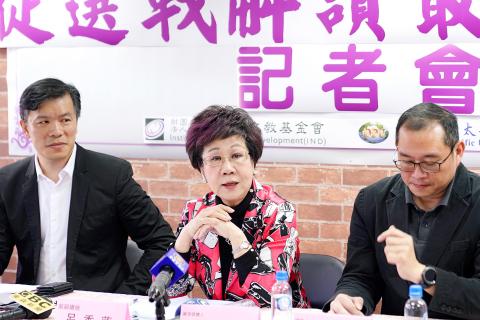Taiwan should become a permanently neutral nation as an alternative to either unification with China or independence, former vice president Annette Lu (呂秀蓮) said yesterday.
Chinese President Xi Jinping (習近平) on Wednesday in a speech said that Taiwan “must and will be” united with China based on the so-called “1992 consensus” and in accordance with the “one China” principle, and proposed a Taiwanese version of the “one country, two systems” model.
Lu, who left the Democratic Progressive Party (DPP) last year, said that there is no longer a “1992 consensus,” but only “one China, two systems (一中兩制).”

Photo: Huang Hsin-po, Taipei Times
The “1992 consensus,” a term former Mainland Affairs Council chairman Su Chi (蘇起) in 2006 admitted making up in 2000, refers to a tacit understanding between the Chinese Nationalist Party (KMT) and the Chinese government that both sides of the Strait acknowledge there is “one China,” with each side having its own interpretation of what “China” means.
Xi said he would not rule out the use of force, so the option of peaceful unification is also off the table, Lu said, adding that by the same token, maintaining the “status quo” is likely impossible and a new approach is needed.
Taiwan could only take three paths, she said.
First, it could accept China’s “one China, two systems,” in which China is the People’s Republic of China (PRC), she said.
Second, the nation could push for formal independence, whether as the Republic of China or as Taiwan, she said.
The third path is to become a permanently neutral nation, Lu said.
She said she would officially launch a referendum proposal on Feb. 27 to make Taiwan permanently neutral and would travel to the US in March to promote the idea.
Separately, on Saturday, Hong Kong democracy advocate Leung Kwok-hung (梁國雄) said that Hong Kongers’ rights have diminished since the adaption of “one country, two systems.”
Toward the end of 1984, China and the UK signed the Sino-British Joint Declaration on the question of Hong Kong, with annexes promising that Hong Kong would remain autonomous for 50 years, he said.
In 1990, the Chinese National People’s Congress (NPC) passed the Basic Law of the Hong Kong Special Administrative Region, the territory’s miniconstitution, he said.
However, the promises made to Hong Kongers in both documents have never been fulfilled, he said, adding that the situation has deteriorated instead.
To the Chinese Communist Party (CCP), “one country, two systems” means implementing two systems within one country, but the CCP’s sovereignty over Hong Kong is absolute and Hong Kong was never given the “high degree of autonomy” mandated by the Basic Law, he said.
In 2007, the NPC agreed that the chief executive of Hong Kong would be elected by universal suffrage in 2017, but in 2014, it rejected universal suffrage, he said.
The articles in the Basic Law that protect the public’s rights are constantly being amended, he added.
The right to interpret the Basic Law belongs to the NPC Standing Committee and its interpretation of the law can overturn the interpretation of the Hong Kong Court of Final Appeal, he said.
Hong Kong’s rule of law has become the rule of man, he said, urging Taiwan not to accept a “one country, two systems” arrangement.

Taiwan is stepping up plans to create self-sufficient supply chains for combat drones and increase foreign orders from the US to counter China’s numerical superiority, a defense official said on Saturday. Commenting on condition of anonymity, the official said the nation’s armed forces are in agreement with US Admiral Samuel Paparo’s assessment that Taiwan’s military must be prepared to turn the nation’s waters into a “hellscape” for the Chinese People’s Liberation Army (PLA). Paparo, the commander of the US Indo-Pacific Command, reiterated the concept during a Congressional hearing in Washington on Wednesday. He first coined the term in a security conference last

Prosecutors today declined to say who was questioned regarding alleged forgery on petitions to recall Democratic Progressive Party (DPP) legislators, after Chinese-language media earlier reported that members of the Chinese Nationalist Party (KMT) Youth League were brought in for questioning. The Ministry of Justice Investigation Bureau confirmed that two people had been questioned, but did not disclose any further information about the ongoing investigation. KMT Youth League members Lee Hsiao-liang (李孝亮) and Liu Szu-yin (劉思吟) — who are leading the effort to recall DPP caucus chief executive Rosalia Wu (吳思瑤) and Legislator Wu Pei-yi (吳沛憶) — both posted on Facebook saying: “I

The Ministry of Economic Affairs has fined Taobao NT$1.2 million (US$36,912) for advertisements that exceed its approved business scope, requiring the Chinese e-commerce platform to make corrections in the first half of this year or its license may be revoked. Lawmakers have called for stricter enforcement of Chinese e-commerce platforms and measures to prevent China from laundering its goods through Taiwan in response to US President Donald Trump’s heavy tariffs on China. The Legislative Yuan’s Finance Committee met today to discuss policies to prevent China from dumping goods in Taiwan, inviting government agencies to report. Democratic Progressive Party Legislator Kuo Kuo-wen (郭國文) said

The Ministry of Economic Affairs has fined Taobao NT$1.2 million (US$36,900) for advertisements that exceeded its approved business scope and ordered the Chinese e-commerce platform to make corrections in the first half of this year or its license would be revoked. Lawmakers have called for stricter supervision of Chinese e-commerce platforms and more stringent measures to prevent China from laundering its goods through Taiwan as US President Donald Trump’s administration cracks down on origin laundering. The legislature’s Finance Committee yesterday met to discuss policies to prevent China from dumping goods in Taiwan, inviting government agencies to report on the matter. Democratic Progressive Party